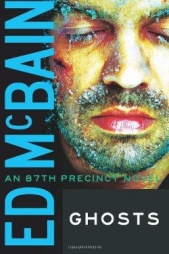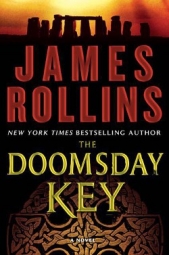Ghosts

Ghosts читать книгу онлайн
It’s Christmastime and Detective Carella gets assigned three murders — including a bestselling author of ghost stories — and is soon after ghosts, mediums, and a crazed killer.
Внимание! Книга может содержать контент только для совершеннолетних. Для несовершеннолетних чтение данного контента СТРОГО ЗАПРЕЩЕНО! Если в книге присутствует наличие пропаганды ЛГБТ и другого, запрещенного контента - просьба написать на почту [email protected] для удаления материала
At ten minutes to 5:00 he stopped by at the billiard parlor to make sure nobody was breaking anybody else’s head with a pool cue. At four minutes to 5:00 he dropped into the greasy spoon next door and declined the proprietor’s proffered cup of coffee, telling him he’d stop back later tonight. He was walking past Martin Levy’s pawnshop at precisely two minutes past the hour when the opportunity to become a hero presented itself. The gates on the shop were already up for the night, but a light was still burning inside. Fujiwara saw nothing unusual about this; Mr. Levy often worked inside for a half hour or more after he’d locked up. He did not even glance into the shop. He turned back to look at it only because he heard the bell over the door jingle, and he was surprised to see a hatless dark-haired man running out into the rain with what appeared to be a diamond necklace clutched in his fist.
Fujiwara did not have the faintest inkling that this was Hillary Scott’s eighteen-karat gold choker set with diamonds and valued at $16,500. Nor did he know that Levy’s shop had been one of those judiciously eliminated from Carella’s list because it was impossible to cover eight shops with two men to a shop when there were only an even dozen men available for the job. In fact, Fujiwara didn’t even know a stakeout operation was currently in progress at assorted pawnshops in the precinct; such information was rarely passed on to mere patrolmen, lest they behave in ways that might blow the whole undercover scheme. Fujiwara was just a poor wet slob walking his beat and witnessing what looked a hell of a lot like a robbery in progress. As the man ran out of the shop, he stuffed the necklace into the pocket of his coat, and if Fujiwara had entertained any doubts before that moment, they all vanished now. Drawing his pistol, he shouted, “Police officer! Halt or I’ll shoot!” and the fleeing man knocked him flat on his ass on the sidewalk and then trampled over him like a herd of buffalo and continued running for the corner of the block.
Fujiwara rolled over onto his belly and, holding the gun with both hands and propping himself on his elbows the way he’d been taught at the academy, pulled off two shots in succession at the fleeing man’s legs. He missed both times and swore under his breath as the man turned the corner out of sight. Fujiwara was on his feet at once. His gun in his right hand, his black poncho flapping so that he resembled a giant bat flitting through the rain, he reached the corner, and turned it, and found himself face to face with the man he’d been chasing. The man was holding what looked like a bread knife in his right hand.
Not knowing the man was a suspect in three murders, believing only that he’d stolen a piece of jewelry from Mr. Levy’s pawnshop, Fujiwara’s eyes opened wide in combined fright, surprise, and disbelief. It was one thing to walk into a store where some cheap thief was holding a gun on somebody; in a situation like that you might expect an attack. But this guy had already rounded third and was heading for home, so why the hell was he risking a hassle with a cop? You dope, I’m a cop! Fujiwara thought, and stepped aside in reflex to dodge the knife. The tip of the knife penetrated the poncho, missing his body by an inch, snagging on the rubberized fabric, and then pulling free again for what Fujiwara hoped would not be a more definitive thrust. This time he didn’t bother with the niceties of shooting below the waist. This time he fired straight at the man’s chest, and this time he hit him—not in the chest, but in the shoulder, which was plenty good enough. The man reeled back from the force of the slug. The knife dropped from his hand and clattered to the slippery wet pavement. He was turning to run again when Fujiwara said, so softly that it sounded almost like the whisper of the rain, “Mister, you’re dead,” and the man stopped in his tracks, and nodded his head, and to Fujiwara’s great astonishment began weeping.
The formal Q and A took place in Jack Rawles’s hospital room at 8:20 P.M. on New Year’s Eve. Present were Lieutenant Peter Byrnes, Detective Stephen Louis Carella, Detective Cotton Hawes, and an assistant district attorney named David Saperstein. A police stenographer took down everything that was said. Saperstein asked all the questions; Rawles gave all the answers.
Q: Mr. Rawles, can you tell us when and how you came into possession of the choker you tried to pawn on December twenty-ninth?
A: I took it because I was entitled to it.
Q: When was this, Mr. Rawles?
A: I already told the police officers.
Q: Yes, but this is a formal statement you’re now making, and I wish you’d repeat it all for me.
A: It was December twenty-first.
Q: How did you come into possession of it on that date?
A: I took it from Gregory Craig’s apartment.
Q: Did you steal any other—?
A: I didn’t steal it. I took it as partial payment of a debt.
Q: What debt?
A: The money Gregory Craig owed me.
Q: How much money did he owe you?
A: Half the receipts on Deadly Shades.
Q: Deadly shades, did you say?
A: Yes.
Q: Deadly shades? I’m sorry, what…?
A: You’ve got to be kidding.
Q: No, I’m not. What do you mean by deadly shades?
A: It’s a book. Gregory Craig was a writer.
Q: Oh, I see. And you took the choker from his apartment because you felt he owed you fifty percent…
A: By contract.
Q: You had a contract with Mr. Craig?
A: I did. Fifty percent of the receipts on the book. In black and white and signed by both of us.
Q: I see. And where is that contract now?
A: I don’t know. That’s why I went up there. To get a copy of it.
Q: We’re talking now about December twenty-first, are we?
A: Yes.
Q: Which is when you went to see Mr. Craig to get a copy of the contract.
A: Yes. My copy got lost in a fire. I used to live on Commonwealth Avenue in Boston. I had a fire in my apartment, and the contract went up with everything else.
Q: So…if I understand this…After the fire, there was only Mr. Craig’s copy of the contract.
A: Yes. Which is why I went up there. To see if I could get it.
Q: What time did you get there, Mr. Rawles?
A: At about five o’clock.
Q: We are referring now to 781 Jackson Avenue, are we?
A: Yes. Craig’s apartment.
Q: And you got there at five o’clock on the evening of December twenty-first.
A: Yes.
Q: What did you do when you got there?
A: I told the security guard I was Daniel Corbett. I knew Corbett had been the editor on the book. I read a story about them in People magazine.
Q: Why did you use a false name?
A: Because I knew Craig wouldn’t let me up otherwise. I’d written letters to him, I’d tried calling him. He never answered my letters, and he used to hang up when I called. Finally, he changed his phone number. That’s why I came down to the city. To talk to him personally. To demand my share of the money.
Q: What happened when you went upstairs?
A: I rang the doorbell, and Craig looked out at me through the peephole. I told him I didn’t want any trouble, I just wanted to talk to him.
Q: Did he open the door for you?
A: Yes, but only because I told him I was going to go see the district attorney if he wouldn’t talk to me.
Q: We are referring now to Apartment 304, are we?
A: Yes, I guess so. I don’t remember what apartment it was. The security guard told me, and I went up, but I don’t remember now what the number was.
Q: What happened after you entered the apartment?
A: We sat down and talked.
Q: What about?
A: The money he owed me. He knew I’d had that fire, I was stupid enough to write to him afterward and ask him for a copy of the contract.
























